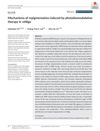
Low-level laser therapy may help stem cells grow and function better, aiding in healing and tissue repair.
April 2024 in “International journal of molecular sciences” Light-based treatment, Photobiomodulation, shows promise for non-invasive skin therapy with few side effects.
 3 citations,
December 2020 in “Scientific reports”
3 citations,
December 2020 in “Scientific reports” Mitochondrial problems in tooth cells lead to bad enamel and dentin development in mice.
 1 citations,
September 2019 in “BMC veterinary research”
1 citations,
September 2019 in “BMC veterinary research” Malarone® caused pancreatitis and hair loss in a dog for the first time.
 June 2011 in “CRC Press eBooks”
June 2011 in “CRC Press eBooks” Low-Level Laser Therapy can stimulate healing and cell function, potentially leading to wider medical use.
 39 citations,
June 2017 in “Scientific Reports”
39 citations,
June 2017 in “Scientific Reports” Different lab conditions and light treatment methods change how human skin cells respond to light therapy.
 36 citations,
April 2016 in “Experimental Dermatology”
36 citations,
April 2016 in “Experimental Dermatology” Photobiomodulation may help with hair growth and wound healing, but research is inconsistent and needs better quality studies.
 31 citations,
February 1997 in “The Journal of Clinical Endocrinology and Metabolism”
31 citations,
February 1997 in “The Journal of Clinical Endocrinology and Metabolism” People who carry the 21-Hydroxylase Deficiency gene are not more likely to have excessive male hormone levels.
 30 citations,
July 2017 in “BioEssays”
30 citations,
July 2017 in “BioEssays” Activating NRF2 might help treat hair disorders by improving antioxidant defenses.
 22 citations,
November 2008 in “International Journal of Dermatology”
22 citations,
November 2008 in “International Journal of Dermatology” A mix of 5-aminolevulinic acid and iron ion can speed up hair growth.
 21 citations,
January 2019 in “Experimental dermatology”
21 citations,
January 2019 in “Experimental dermatology” Light therapy using helium-neon lasers can help restore skin color in vitiligo by promoting skin cell growth and movement.
 15 citations,
June 2015 in “Lasers in Medical Science”
15 citations,
June 2015 in “Lasers in Medical Science” The 830-nm wavelength was most effective at promoting hair growth in rats using low-level laser therapy.
 14 citations,
July 2016 in “Environmental Toxicology and Pharmacology”
14 citations,
July 2016 in “Environmental Toxicology and Pharmacology” Cedrol may prevent hair loss caused by chemotherapy better than minoxidil.
 9 citations,
January 2015 in “Fundamental & clinical pharmacology”
9 citations,
January 2015 in “Fundamental & clinical pharmacology” Cyclosporine A helps hair grow by blocking a process that would otherwise cause hair cells to die.
 8 citations,
October 2020 in “Lasers in Medical Science”
8 citations,
October 2020 in “Lasers in Medical Science” LLLT helps treat hair loss by increasing blood flow, reducing inflammation, and stimulating growth factors.
 4 citations,
July 2020 in “BMC Complementary Medicine and Therapies”
4 citations,
July 2020 in “BMC Complementary Medicine and Therapies” Human placenta helps hair grow back after chemotherapy by blocking cell death and increasing hair follicle growth.
 2 citations,
December 2017 in “Bangladesh Journal of Pharmacology”
2 citations,
December 2017 in “Bangladesh Journal of Pharmacology” Black seed oil significantly protects against hair loss from chemotherapy.
June 2024 in “Cermin Dunia Kedokteran” Low level laser therapy is effective and safe for various skin and hair conditions.
 May 2024 in “Brazilian Journal of Hair Health”
May 2024 in “Brazilian Journal of Hair Health” Phototherapy with red and blue light can effectively treat hair loss.
 December 2022 in “Medical lasers”
December 2022 in “Medical lasers” Low-level laser therapy may help with hair regrowth in alopecia areata but its effectiveness for psoriasis and atopic dermatitis needs more research.

Low-level laser therapy combined with Neoptide improved hair regrowth better than either treatment alone in rats.
 1057 citations,
November 2011 in “Annals of Biomedical Engineering”
1057 citations,
November 2011 in “Annals of Biomedical Engineering” Low-level Laser Therapy may help reduce inflammation, pain, and aid healing, but more research is needed to confirm its effectiveness and establish standard treatment guidelines.
 989 citations,
August 2007 in “The Lancet”
989 citations,
August 2007 in “The Lancet” PCOS is a complex condition with major health impacts, needing more research for better diagnosis and treatment.
 491 citations,
July 2000 in “The Journal of Clinical Endocrinology and Metabolism”
491 citations,
July 2000 in “The Journal of Clinical Endocrinology and Metabolism” Polycystic ovary syndrome is found in 6.5% of unselected Caucasian women in Spain.
 298 citations,
July 2000 in “The Journal of Clinical Endocrinology and Metabolism”
298 citations,
July 2000 in “The Journal of Clinical Endocrinology and Metabolism” About 6.5% of young Caucasian women in Spain have polycystic ovary syndrome.
 252 citations,
January 2008 in “Trends in Endocrinology and Metabolism”
252 citations,
January 2008 in “Trends in Endocrinology and Metabolism” Melatonin in the skin helps protect against damage from stress and UV rays, and could be used to treat certain skin conditions.
 195 citations,
January 2008 in “Photochemistry and Photobiology”
195 citations,
January 2008 in “Photochemistry and Photobiology” Visible light can damage skin and most sunscreens don't block it well; more research is needed on its effects and protection methods.
 165 citations,
August 2013 in “Lasers in Surgery and Medicine”
165 citations,
August 2013 in “Lasers in Surgery and Medicine” Low-Level Laser Therapy is effective and safe for hair growth with minimal side effects.
 158 citations,
August 2011 in “Reviews in endocrine and metabolic disorders”
158 citations,
August 2011 in “Reviews in endocrine and metabolic disorders” Vitamin D and its receptor regulate skin functions like cell growth, immunity, hair cycle, and tumor prevention.
 147 citations,
January 2014 in “American Journal of Clinical Dermatology”
147 citations,
January 2014 in “American Journal of Clinical Dermatology” Laser device increases hair density, safe for treating hair loss in men and women.




























